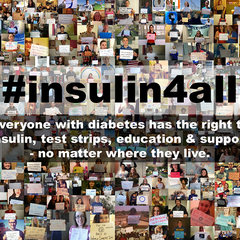
Diabetes Access Guilt
20 Oct 2017, 4:50 p.m. in Global Stories by Anna Pintsuk
Since I was diagnosed with type 1 diabetes (T1D) at the age of 14 in Austria, I never really had a problem dealing with the fact that my pancreas had gone on an endless vacation. Sure, I had questions like “Why me?” and “Am I the only one?” at the beginning of my diagnosis, but I have never struggled with accepting the fact that diabetes would be my partner in crime for the rest of my life. Instead of being sad, I was actually a bit relieved when I understood what was making me feel so weak. I was glad that I finally started feeling like myself again.
So, in the course of having to write a research paper in order to graduate high school, which I chose to write about kids and teenagers with T1D in developing countries, I started learning about the challenges life with T1D is in different countries. I read everything about diabetes in low-income countries that I could get my hands on. The more I read about that topic, the more I realized how fortunate I am to live in a country where I have access to insulin, where I do not have to worry about its price and accessibility or about how I would pay for everyday necessities that help keep my blood sugar in range.
Along with being grateful that I am so lucky to live in a country where I did not have to constantly think about healthcare, comes a feeling of guilt. I often wonder why I am so lucky. Why do other people die because they cannot afford insulin or because they do not even have access to it? These are the kinds of questions that I am constantly asking myself. And although I know that I will never receive an answer, I still sometimes struggle with that feeling.
Knowing that nearly 100 years after the discovery of insulin so many people still have to die, or have to suffer serious complications because of the unavailability of insulin in some parts of the world, distresses me. Reading and hearing so many horrible and sad stories about kids being denied healthcare and a normal life just breaks my heart.
There are little girls in India who will not get any insulin at all because of their gender, or they are left behind to die because they will never be able to go to school or cannot get married because of their diabetes diagnosis. There are families who cannot afford to buy enough food for themselves, as they somehow have to come up with a sufficient amount of money to cover the expenses for life saving tools such as test strips, needles or even a glucose meter to keep their child alive. There are also families who have no choice but to abandon their kid so that they can feed their other kids due to the incredibly high price of insulin. Not to mention, the lack of education about T1D. Many people die before even getting their diagnosis because of missing general information about this chronic disease and its symptoms.
Every time that I get frustrated because of something related to my own T1D, I become even more frustrated about the fact that I am upset, because I think that I should not have any reason to feel the way I feel. After all, I am so lucky to have access to all the vital things I need, so I should be happy and stop complaining about my life and having to deal with a crazy blood sugar roller-coaster.
Of course a part of me knows that this is complete nonsense, since everybody is entitled to their emotions and how they feel. It is okay not to be okay. It is absolutely fine not to be happy every day and to get frustrated about having crazy blood sugar values, or when you just cannot seem to bring up or lower your blood sugar. We are all human and struggling, and being down is part of that. It’s OK as long as you get up again, fight and try to do your best every single day.
Living with type 1 diabetes is tough no matter who you are, how old you are or where you are. That is why I believe making each other feel empowered is so important. That is why I joined T1International to be able to support and empower people in my own country, but also to do my part in an organization supporting people in the difficult situations I mentioned above.
Remember: It is OK to complain. Instead of feeling guilty, try to feel grateful, and then take action! There are so many amazing ways support other people with type 1 diabetes. Just helping other diabetics by showing them that they are not alone, and that there are other people who know exactly what you are going through is invigorating. Educating other people about T1D, its symptoms and main facts is another great way to advocate.
You can also visit www.t1international.com to sign the global Type 1 Diabetes Charter, download the advocacy toolkit, or fundraise to support long-term solutions that ensure that everyone with T1D has the same kind of access and care regardless of their origin, age or gender.








